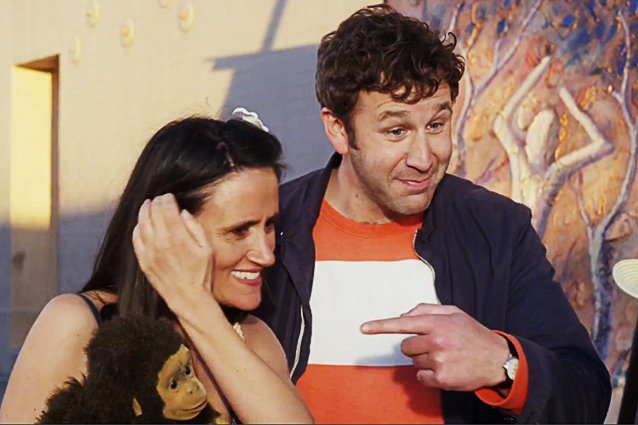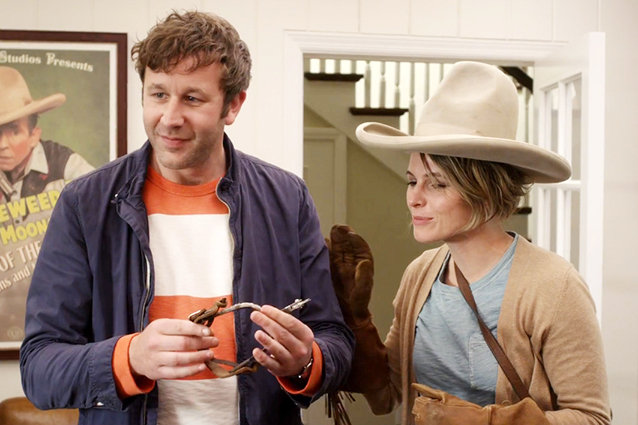
Since delving into Christopher Guest’s new television series Family Tree, I have been asked by many a Best in Show and A Mighty Wind fan deprived of an HBO subscription, “Is it hilarious?” And the answer, the unabashed truth, is no. Throughout the seven-episode season, I found myself going full half-hours without more than a laugh or two — and we’re talking modest chuckles. Approaching the program with the expectations garnered from years of adoring Guest’s uproarious big screen work, I found myself perplexed by the pilot: Are these punchlines supposed to earn more than just a knowing smirk? Are the gags and quirks of these subdued characters meant to stand up against the riotous one-liners of Guest’s past work? Perhaps the director was going for something different, something alogether new, with this venture — something that might aptly be defined not only by its comedy but by its drama.
A full season having gone by, I still wonder exactly what Family Tree was going for all this time, whether it meant to identify itself by its laughter or its heart. But this muddled identity notwithstanding, these seven episodes proved that Guest knows precisely how to tell a story. On Sunday night, the chapter closed on star Chris O’Dowd’s wayward hero Tom Chadwick, a recently unemployed and newly single 30-year-old Londoner who compenstates for his new void of substantial happiness by investigating his own family tree (an exploit brought on by the passing of a great aunt he barely knew). Having somewhat of a conflicted relationship with his alarmingly eccentric sister Bea (Nina Conti) — who carres a monkey puppet with her at all times through which to speak candidly — and their moreover distant father Keith (Michael McKean), Tom seems to look at family as the “final frontier,” after coming up short in the realms of the romantic and the professional.
And so, his journeys take him much farther than he might have anticipated. He discovers his roots in showbiz, a set of unknown second cousins in a rural England town, and — in what seems to be the pay-off to which the first half of the season had been leading — takes a trip to U.S. soil when he finds out about a collection of Chadwicks residing across the pond, dating back to the 1800s.

The latter four episodes have Tom uniting with his American brethren: conspiracy theorist Al (Ed Begley Jr.) and his flighty hippie wife Kitty (Carrie Aizley), an eccentric but good-hearted pair who open their home to their visiting cousin; Civil War reenactor Rick (Matt Greisser) and his incurably blunt girlfriend Julie (Maria Blasucci), who also enjoy their share of clubbing; and oddball Southerner Dave (Guest himself), who suffers from a vestigial tail and hasn’t seen his wife in two years. But his journeys do not cease with the Chadwicks — Tom learns, through interracting with his new kinfolk, that he has roots in American Indian and Jewish lineages, eventually coming to meet the equally amicable Schmelff side of the family (which includes the familiar faces of Kevin Pollak and Guest fixture Bob Balaban).
Recalling just how eager each new character is to welcome Tom into his or her life and home offers a new rationale behind what makes Family Tree work so well in the absence of obviously laugh-out-loud comedy, or punch-to-the-gut tearjerker moments. Whereas Tom’s plight to find new family could have easily disintegrated into mayhem in the face of unanticipated madness, the quirks and eccentricities of his new relatives are met with the sort of kindly, humorous sensibility that you adopt to approach your own relatives’ psychological shortcomings. Everyone that Tom meets, even Rick’s didactic historian friend Harvey (Don Lake) who grows frustrated with Tom’s irreverence for their Civil War reenactments, is more than happy to help him on his mission, and is just as excited as he about the background and legacy of the Chadwick clan.
Of course, the series takes some pretty standard turns: Tom meets an American girl, Ally (Amy Seimetz), whom he saves from a scuffle via his talents assessing the point of fault in traffic accidents, and becomes smitten with her, as does she with him. In the finale, he pioneers a ribald affection for his sister, warts and all, when he steals back her beloved Monk after it has been apprehended by a stubborn charity worker. These are the “high points” of the show’s energy, the explosions of purpose and direction. Otherwise, Family Tree delivers a slight, slow, smooth arc to get Tom over his breakup and layoff, allowing him a new sense of self worth, which he derives from his bloodline adventure. And it’s as engaging as it is pleasant.
Its outlying climactic beats aside, the series takes pride in its low energy and its realism, melding that classic Guest nuttiness with some down-to-earth charm. It’s not as much a comedy as it is a venerable slice of life — we accompany Tom on his trip, which fits not to any particular storytelling form, but unravels organically as he learns about, contemplates, and experiences these new episodes of his life. So perhaps it isn’t a misplaced identity at all, but just one that we don’t often see on television: a program that realizes we don’t need excess comedy or drama to stuff a story. We just need to be, as the character of Tom is at his core, fascinated with the intrinsically majestic idea of a story itself.
Follow Michael Arbeiter on Twitter @MichaelArbeiter | Follow hollywood.com on Twitter @hollywood_com
More:
‘Family Tree’ Pilot Review
Watch the ‘Family Tree’ Trailer
‘Veep’ Season 2 Finale
From Our Partners: What Happened to 33 Child Stars (Celebuzz)
What Happened to 33 Child Stars (Celebuzz) 40 Most Revealing See-Through Red Carpet Looks (Vh1)
40 Most Revealing See-Through Red Carpet Looks (Vh1)


